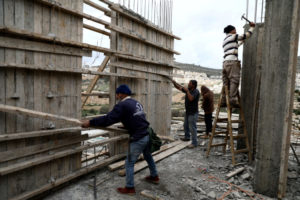In Jerusalem under strict lockdown due to the COVID-19 pandemic, the abnormal quiet of the streets is disturbed by the familiar din of business-as-usual drilling and construction. Both the Israeli government and Palestinian Authority (PA) have enforced various lockdown measures since early March. But, as in other countries, the authorities are using their own criteria to decide which sectors are deemed essential. In Israel, the construction sector along with agriculture, health and nursing have been ordered to remain open.
P
Construction and infrastructure projects in Israel, and in Israeli settlements within the West Bank, are hugely dependent upon Palestinian labor. Under a lockdown in a pandemic this means that Palestinian workers are exposed to serious health risks while helping Israel cement its control over Palestinian land and people. As an example, my family’s home in Jerusalem is located in the neighborhood of Shuafat. The Jerusalem municipality has confiscated about 10 feet from all the properties on our street in order to expand the road for the “public good.” The bureaucratic requirements for submitting an objection to this expansion cost approximately $15,000 (50,000 NIS). No resident was able to do so, and in the middle of a lockdown the work began. The laborers, contracted from the West Bank, were ordered to demolish the walls of Palestinian residents of Jerusalem for a road that will only serve to further fragment Palestinian neighborhoods in the city and facilitate Israeli circulation.
As of May 15, Israel had 16,539 confirmed COVID-19 cases and 262 deaths. There have been 548 confirmed cases and 4 deaths in the Palestinian territories of the West Bank, Gaza and East Jerusalem. Before March, according to Palestinian Minister of Health May Kaileh, the primary sources of coronavirus infection in the West Bank were the tourism industry (13 percent of cases) and Palestinians returning from abroad (10 percent). A small outbreak of the virus in Bethlehem was traced to a tourist group lodged in a local hotel. It was swiftly contained with a city-wide curfew.
With tourism and travel effectively halted, the source of contagion for the Palestinian population in the West Bank and Gaza is now Palestinian laborers who are propping up Israel’s construction economy and agribusiness by transiting back and forth to Israel and Israeli settlements in the West Bank. Two COVID-19 deaths in the West Bank are attributed to contact with Palestinians working in Israel and 75 percent of confirmed cases have been traced to these workers.The pandemic is entrenching already existing patterns of debt, surveillance, labor exploitation and Israeli control over Palestinian land and life. The current crisis further highlights the multiple ways Israeli employers, trade unions and the state exploit Palestinian laborers to bolster Israel’s settler-colonial project, while cutting costs and displacing responsibility for the protection of workers onto the weak infrastructure of the Palestinian healthcare sector and economy.

